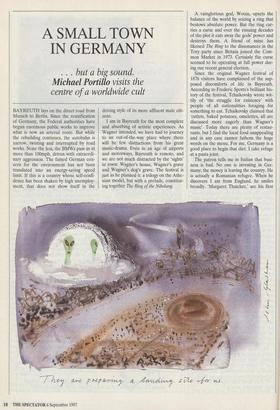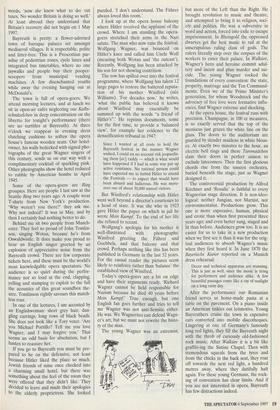A SMALL TOWN IN GERMANY
BAYREUTH lays on the direct road from Munich to Berlin. Since the reunification of Germany, the Federal authorities have begun enormous public works to improve what is now an arterial route. But while the rebuilding continues, the autobahn is narrow, twisting and interrupted by road works. None the less, the BMWs pass us at more than 100mph, driven with extraordi- nary aggression. The famed German con- cern for the environment has not been translated into an energy-saving speed limit. If this is a country whose self-confi- dence has been shaken by high unemploy- ment, that does not show itself in the driving style of its more affluent male citi- zens.
I am in Bayreuth for the most complete and absorbing of artistic experiences. As Wagner intended, we have had to journey to an out-of-the-way place where there will be few distractions from his great music-drama. Even in an age of airports and motorways, Bayreuth is remote, and we are not much distracted by the 'sights' in town: Wagner's house, Wagner's grave and Wagner's dog's grave. The festival is just as he planned it: a trilogy on the Athe- nian model, but with a prelude, constitut- ing together The Ring of the Nibelung. A vainglorious god, Wotan, upsets the balance of the world by seizing a ring that bestows absolute power. But the ring car- ries a curse and over the ensuing decades of the plot it eats away the gods' power and destroys them. A friend of mine has likened The Ring to the dissonances in the Tory party since Britain joined the Com- mon Market in 1973. Certainly the curse seemed to be operating at full power dur- ing our recent general election.
Since the original Wagner festival of 1876 visitors have complained of the sup- posed discomforts of life in Bayreuth. According to Frederic Spotts's brilliant his- tory of the festival, Tchaikovsky wrote wit- tily of 'the struggle for existence' with people of all nationalities foraging for something to eat. Tchaikovsky claimed that `cutlets, baked potatoes, omelettes, all are discussed more eagerly than Wagner's music'. Today there are plenty of restau- rants, but I find the local food unappealing and in any case cannot fathom the huge words on the menu. For me, Germany is a good place to begin that diet. I take refuge at a pasta joint.
The patron tells me in Italian that busi- ness is bad. No one is investing in Ger- many; the money is leaving the country. He is actually a Romanian refugee. When he discovers I am from England, he smiles broadly. 'Margaret Thatcher,' are his first words, 'now she knew what to do: cut taxes. No wonder Britain is doing so well.' At least abroad they understand that Britain's recovery did not begin on 1 May 1997.
Bayreuth is pretty: a flower-adorned town of baroque palaces set amongst mediaeval villages. It is respectable, polite and litter-free. This is a Prescottian par- adise of pedestrian zones, cycle lanes and integrated bus timetables, where no one jaywalks and people buy their pooper- scoopers from municipal vending machines. A few disenchanted youths while away the evening hanging out at McDonald's.
The town is full of opera-goers. We attend morning lectures, and at lunch we sit in open-air cafés neglecting our Kalbs- schnitzelchen in deep concentration on the libretto for tonight's performance (there are no surtitles at Bayreuth). At three o'clock we reappear in evening dress clutching cushions to soften the opera house's famous wooden seats. Our hotel- owner, his walls bedecked with signed pho- tographs of the great Wagner singers of this century, sends us on our way with a complimentary cocktail of sparkling pink. Other photographs show the hotel reduced to rubble by American bombs in April 1945.
Some of the opera-goers are Ring groupies. Here are people I last saw at the Seattle Ring two years ago. A couple wear T-shirts from New York's production. `Why weren't you there?' they ask me. Why not indeed? It was in May, and by then I certainly had nothing better to do.
Behind me sit two people from Manch- ester. They feel so proud of John Tomlin- son, singing Wotan, because he's from Oswaldwistle. It does make you proud to hear an English singer greeted by an explosion of appreciative noise from the Bayreuth crowd. There are few corporate tickets here, and these must be the world's most knowledgable opera spectators. No audience is so quiet during the perfor- mance nor so loud at the end, clapping, yelling and stamping to exploit to the full the acoustics of this great soundbox the- atre. Tomlinson rightly savours this match- less roar.
In one of the lectures, I am accosted by an Englishwoman: short grey hair, dan- gling earrings, long rows of black beads. She does not look like a Tory voter. 'Are you Michael Portillo? Tell me you love Wagner, and I may forgive you.' That seems an odd basis for absolution, but I hasten to reassure her.
If you go to Bayreuth you must be pre- pared to be on the defensive, not least because Hitler liked the place so much. Jewish friends of mine once checked into a charming small hotel, but there was something about the feel of the room they were offered that they didn't like. They decided to leave and made their apologies to the elderly proprietress. She looked puzzled. 'I don't understand. The Fiihrer always loved this room.'
I look up at the opera house balcony where Hitler received the applause of the crowd. Where I am standing the opera- goers stretched their arms in the Nazi salute. The man who now runs the festival, Wolfgang Wagner, was bounced on Hitler's knee and called him Uncle Wolf (meaning both Wotan and 'the outcast'). Recently, Wolfgang has been attacked by his son for not showing contrition.
The row has spilled over into the festival programme, where Wolfgang has taken 12 large pages to restore the battered reputa- tion of his mother Winifred (née Williams). 'For decades now,' he writes, `what the public has believed it knows about Winifred may essentially be summed up with the words "a friend of Hitler's".' He reprints documents, some for the first time, to provide a 'balanced view', for example her evidence to the denazification tribunal in 1947: Since I wanted at all costs to hold the Bayreuth festival in the manner Wagner wished, I could on no account risk jeopardis- ing them [sic] rashly — which is what would have happened if I had in some way put up active resistance. No rational person could have expected me to forbid Hitler to attend the Festivals — to expect that would have been absurd and ludicrous. He was more- over one of about 30,000 annual visitors.
But Winifred's relationship with Hitler went well beyond a director's courtesies to a head of state. It was she who in 1923 gave Hitler the paper on which in jail he wrote Mein Kampf. To the end of her life she refused to recant.
Wolfgang's apologia for his mother is well-illustrated with photographs: Winifred greeting the Fiihrer and Goebbels, and that balcony and that crowd. Perhaps nothing like this has been published in Germany in the last 52 years. For the casual reader the pictures seem likely to reinforce rather than 'balance' the established view of Winifred.
Today's opera-goers are a bit on edge and have their arguments ready. 'Richard Wagner cannot be held responsible for Nazism because he died 40 years before Mein Kampf.' True enough, but one English fan goes further and tries to tell me Wagner was not anti-Semitic either. He was. We Wagnerites can defend Wagn- er's art, but we must not rewrite the histo- ry of the man.
The young Wagner was an extremist, but more of the Left than the Right. He brought revolution to music and theatre, and attempted to bring it to religion, soci- ety and politics. He was a subversive in word and action, forced into exile to escape imprisonment. In Rheingold the oppressed dwarves get the best music to rail at the unscrupulous ruling class of gods. The rulers literally step over the corpses of the workers to enter their palace. In Walkiire, Wagner's hero and heroine commit adul- tery and incest and plan murder and sui- cide. The young Wagner rocked the foundations of every convention: the state, property, marriage and the Ten Command- ments. Even we of the Prime Minister's generation, for whom Woodstock and the advocacy of free love were formative influ- ences, find Wagner extreme and shocking.
At the opera house, the festival runs with precision. Champagne, in 100 cc measures, is so exactly served that the top of the meniscus just grazes the white line on the glass. The doors to the auditorium are guarded by slender maidens in white blous- es. At exactly two minutes to the hour, an electric bell rings and these Tiiremadchen slam their doors in perfect unison to exclude latecomers. Then the first glorious chords rise from the unseen orchestra, buried beneath the stage, just as Wagner designed it.
The controversial production by Alfred Kirchner and 'Rosalie' is faithful to every Wagnerian stage direction. It is non-ideo- logical: neither Jungian, nor Marxist, nor environmentalist. Productions grow. This one is more expressive, human, physical and erotic than when first presented three years ago; and even better sung, staged and lit than before. Audiences grow too. It is no easier for us to take in a new production when we first see it than it was for the orig- inal audiences to absorb Wagner's music when they first heard it. In June 1870 the Bayerische Kurier reported on a Munich dress rehearsal:
Decor and technical apparatus are stunning. This is just as well, since the music is tiring for performers and audience alike. A few beautiful passages come like a ray of sunlight on a long rainy day.
After the performance our Romanian friend serves us home-made pasta at a table on the pavement. On a piano inside an American tinkles out leitmotivs. Young Bayreuthers cruise the town in expensive cars converted into mobile discotheques. Lingering at one of Germany's famously long red lights, they fill the Bayreuth night with the throb of curiously old-fashioned rock music. After Walkiire it is a bit like graffiti-ing the Sistine Chapel. Then with tremendous squeals from the tyres and from the chicks in the back seat, they roar off towards the next red light, a hundred metres away, where they dutifully halt again. For these young Germans, the rock- ing of convention has clear limits. And if you are not interested in opera, Bayreuth has few distractions indeed.



























































 Previous page
Previous page